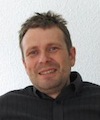Thomas Riechert
 | Prof. Dr. Thomas Riechert Gustav-Freytag-Str. 42A, Zimmer Z507 04277 Leipzig
| ||||||
Projekte
Onto Wiki
is a tool providing support for agile, distributed knowledge engineering scenarios.
Onto Wiki facilitates the visual presentation of a knowledge base as an information map, with different views on instance data. It enables intuitive authoring of semantic content, with an inline editing mode for editing RDF content, similar to WYSIWIG for text documents. [...]
Open Research
This semantic wiki at Open Research.org aims at making the world of science more visible and accessible. Information about scientific events, research projects, publishers, journals etc. is scattered around on the Web. For researchers (especially young ones without decades of experience) it is often difficult to find the relevant venues, people or tools. Also research is increasingly dynamic and multi-disciplinary, so the boundaries between communities blur and new research directions emerge. With this semantic Wiki, we aim to make information about scientific events, research groups, tools, journals etc. more accessible. Open Research.org is not restricted to any field of science. [...]
Professorenkatalog Leipzig
Der Katalog umfasst zunächst alle Leipziger Professoren, die zwischen der Universitätsreform 1830/31 und dem faktischen Ende der Ordinarienuniversität in der frühen DDR an der Leipziger Universität gelehrt haben.
Der ausgewählte Zeitraum korrespondiert damit mit den universitätsgeschichtlich bedeutendsten Phasen seit der Reorganisation der Universität in den 1830er Jahren und ihrer Entwicklung zum modernen wissenschaftlichen Großbetrieb. [...]
Semantic PKM
Personal Knowledge Management (PKM) stellt ein über Ziele definiertes System zur Organisation persönlich wichtiger Informations- und Wissenseinheiten dar. [...]
Soft Wiki
The aim of the cooperative research project Soft Wiki is to support the collaboration of all stakeholders in software development processes in particular with respect to software requirements. Potentially very large and spatially distributed user groups shall be enabled to collect, semantically enrich, classify and aggregate software requirements. The solution will be founded on the Semantic Web standards for terminological knowledge representation. The implementation will base on generic means of semantic collaboration using next generation Web user interfaces (in the spirit of Social Software and the Web 2.0) thus fostering completely new means of Requirements Engineering with very large user groups. [...]